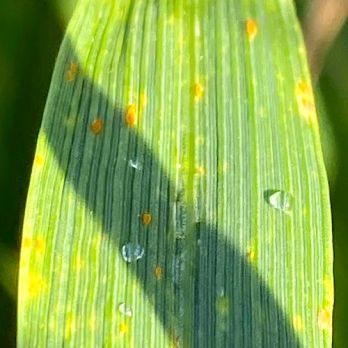Crop Watch August 2022

SA wheat rust detections
Detections of wheat rusts have started early this season. Growers are advised to monitor crops and prepare management strategies.
Wheat leaf rust
Wheat leaf rust has been detected in susceptible varieties on the Lower Eyre Peninsula, Yorke Peninsula, Mallee and South East. The wide spread of inoculum this early in the season may be attributed to high summer rainfalls and associated volunteer plants in many areas of the state. Leaf rust has an optimal temperature range of 15–22°C, therefore conditions in many parts of the state are not currently conducive for rapid reproduction of spores. However, these reports provide an early warning of high inoculum levels. The pathogen will be able to proliferate quickly if humid conditions continue as temperatures rise heading into spring.
Wheat stripe rust
A wheat stripe rust hotspot has been detected near Paskeville on the Yorke Peninsula impacting the susceptible variety Rockstar. Stripe rust has an optimal temperature range of 8–15°C and thrives in damp wet conditions. Seasonal conditions for the remainder of winter are likely to be conducive to stripe rust. Therefore, growers across the state are urged to monitor their paddocks for any signs of stripe rust and implement fungicide regimes where necessary.
Wheat powdery mildew
SARDI has received multiple reports of wheat powdery mildew in the past week from across the state. The observed levels are reported to be the highest in 20 years in the northern Mallee region, and all growers in this area are urged to check crops and implement management strategies in VS-S varieties. Other reports of the disease have come from the Lower Eyre Peninsula and Upper Yorke Peninsula.
Susceptible and very susceptible varieties such as Valiant CL Plus (VS), Vixen (SVS), Scepter (SVS) and Chief CL Plus (SVS) have been the worst infected and are drivers of the epidemic. Paddocks should be monitored for wheat powdery mildew and fungicide regimes implemented where necessary. Fungicides are most effective prior to canopy closure so actives can reach the basal stem where the disease can reside.
For more information see Fungicide resistant wheat powdery mildew – management and resistance testing.
Underperforming crops
SARDI is hosting root health workshops throughout August and September. Growers and advisors are invited to attend these SAGIT funded workshops to investigate the impacts of soil-borne root diseases on plant health.
Each workshop will:
- explore the main soil-borne root diseases in your region, providing an insight into symptoms and management
- include an interactive session where you get to identify root disease and score the root health of your own cereal and pulse crops
- review PREDICTA rNod, a new soil testing service to measure levels of rhizobia that nodulate pulses
- provide opportunity for discussions with SARDI pathologists.
Workshops will be held at:
- Turretfield 9 August
- Wirrulla 16 August
- Cleve 17 August
- Coonalpyn 30 August
- Kangaroo Island 6 September
Stay up to date with the latest disease-related issues and solutions for broadacre crops during the growing season.




